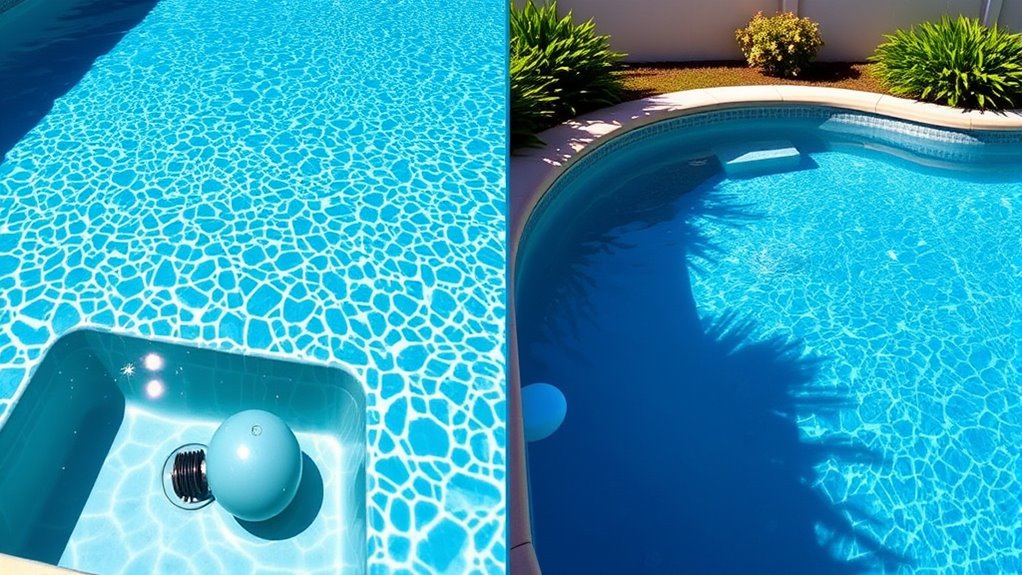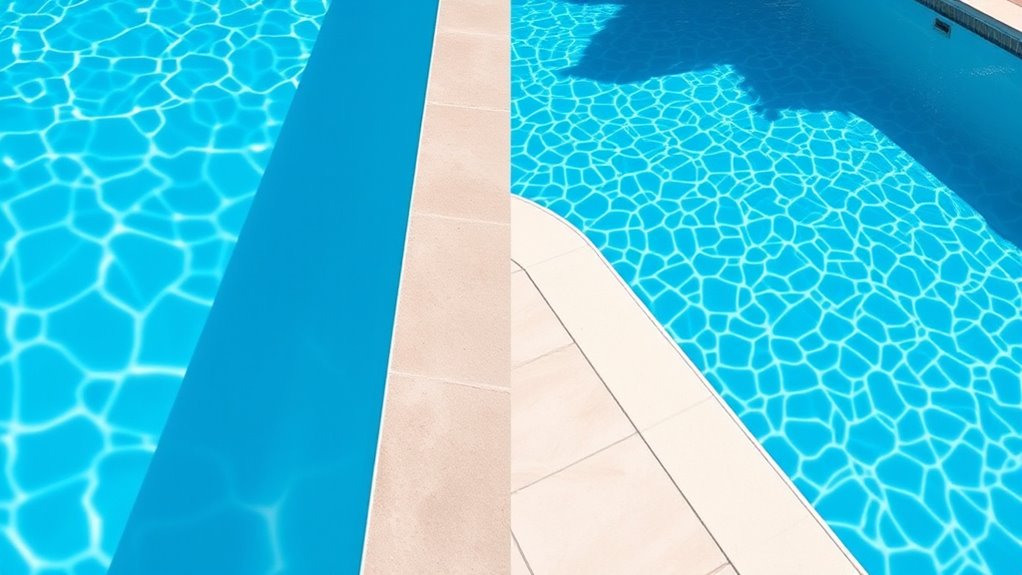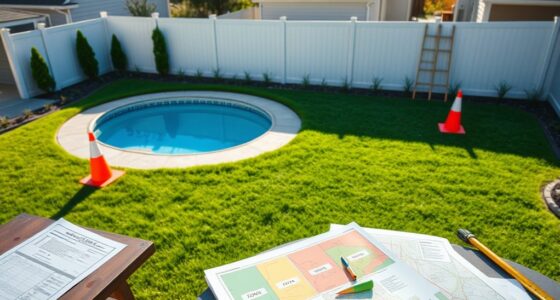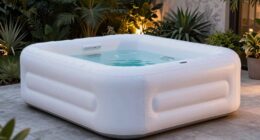If you choose a saltwater pool, expect higher initial costs of $3,000 to $5,000 for installation, thanks to specialized equipment like salt chlorine generators, whereas chlorine pools are typically cheaper upfront at $2,000 to $4,000. Maintenance costs for saltwater pools tend to be lower over time because salt is cheaper and pH levels are more stable, but you’ll need to replace salt cells every few years. If you’re curious about long-term expenses and key differences, there’s more to contemplate.
Key Takeaways
- Saltwater pools have higher initial installation costs ($3,000–$5,000) due to specialized equipment, compared to chlorine pools ($2,000–$4,000).
- Ongoing chemical expenses are lower for saltwater pools because salt is cheaper than chlorine chemicals.
- Saltwater systems require salt cell replacements every 3–5 years, adding long-term costs, while chlorine pools need regular chemical purchases.
- Both systems need filtration, but saltwater pools often need more advanced equipment to handle salt and prevent corrosion.
- Overall, saltwater pools save money on chemicals over time but involve higher upfront investment and maintenance considerations.

When choosing between a saltwater and a chlorine pool, understanding their differences can help you make an informed decision. One of the main considerations is the installation and maintenance cost, which varies significantly between the two types. Saltwater pools typically have a higher upfront installation cost because they require a specialized salt chlorine generator, also known as a salt cell, along with compatible water filtration systems. These systems convert salt into chlorine, providing a more natural sanitizing process. However, once installed, the ongoing expenses tend to be lower since salt is less expensive than purchasing chlorine chemicals regularly.
Maintenance costs are influenced heavily by how well you manage the pool’s chemical balance. Saltwater pools generally maintain a steadier pH level, reducing the need for frequent chemical adjustments, but you still need to monitor and adjust the pool chemical balance periodically. Chlorine pools, on the other hand, often require more hands-on care, as you need to add chlorine regularly and test the water to prevent imbalances that could lead to algae growth or skin irritation. Both systems rely on water filtration systems to keep the water clear, but saltwater pools might demand more sophisticated filtration equipment to handle the salt levels and prevent scaling or corrosion of pool components.
The initial investment in a saltwater system can be substantial, often ranging from $3,000 to $5,000, including the cost of installation and equipment. Chlorine pools tend to be less expensive initially, with basic setups costing around $2,000 to $4,000, depending on the pool size and features. Over time, however, the costs can shift. Saltwater pools save money on chemical purchases, but the salt cell may need replacement every 3 to 5 years, which can cost around $300 to $700. Chlorine pools require ongoing chemical purchases, which can add up over time, especially if you need to treat large volumes of water frequently. Additionally, tuning the pool system can help optimize maintenance and reduce long-term costs.
Frequently Asked Questions
How Does Water Quality Differ Between Saltwater and Chlorine Pools?
You’ll notice water quality differences mainly in water chemistry and pH balance. In saltwater pools, the water tends to be gentler on your skin and eyes, maintaining a more stable pH balance. Chlorine pools often require regular adjustments to keep water chemistry ideal. Saltwater pools generate chlorine naturally, resulting in softer water, while chlorine pools rely on chemical additions. Overall, both pools can provide clean, clear water if you monitor pH and chemistry regularly.
Are Saltwater Pools More Environmentally Friendly Than Chlorine Pools?
You might find saltwater pools more eco-friendly than chlorine pools because they often use eco-friendly materials and require less chemical use. They also tend to be more energy-efficient since they rely on salt chlorinators that generate chlorine naturally. This reduces chemical manufacturing and transportation impacts. Plus, with proper maintenance, saltwater pools produce fewer harmful byproducts, making them a better choice for environmentally conscious swimmers.
What Are the Health Benefits of Saltwater Versus Chlorine Pools?
Imagine a gentle ocean breeze caressing your skin, offering a soothing experience. Saltwater pools provide a milder form of pool sanitization, reducing skin irritation compared to traditional chlorine pools. This means you can enjoy your swim with fewer worries about dryness or redness. Saltwater pools often feel softer and gentler, making your time in the water more comfortable and health-friendly, especially for sensitive skin.
Can I Convert My Existing Chlorine Pool to Saltwater?
Yes, you can convert your existing chlorine pool to a saltwater system through a pool conversion process. You’ll need to install a salt chlorine generator, which produces chlorine from salt in the water. Keep in mind, cost considerations include the initial purchase of equipment and possible upgrades to your pool system. The conversion is usually straightforward, but consulting a professional helps guarantee proper installation and peak performance.
Which Type of Pool Requires More Frequent Chemical Testing?
You need to monitor the chemical balance more frequently in a saltwater pool. Saltwater systems tend to maintain stable chlorine levels, but they still require regular testing to guarantee proper chemical balance and prevent issues like algae growth or skin irritation. In contrast, chlorine pools generally demand more frequent testing of chlorine and pH levels to keep the water safe and clear. So, your testing frequency depends on your pool type and how well you maintain chemical balance.
Conclusion
Choosing between a saltwater and chlorine pool is like deciding between a gentle stream and a lively waterfall—they each have their own charm. Saltwater pools offer a soothing, spa-like oasis with softer water, while chlorine pools provide a trusty, sparkling fortress of cleanliness. Think of your decision as planting a garden: one nurtures serenity, the other resilience. Whichever you pick, your backyard paradise will become a shimmering jewel, inviting you to plunge into endless revitalizing memories.









